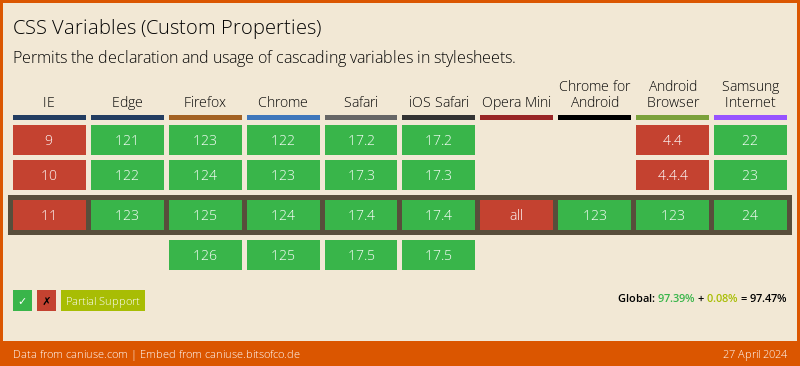postcss-custom-properties
v15.0.1
Published
Use Custom Properties Queries in CSS
Readme
PostCSS Custom Properties
npm install postcss-custom-properties --save-dev
PostCSS Custom Properties lets you use Custom Properties in CSS, following the CSS Custom Properties specification.
:root {
--color-blue-dark: rgb(0, 61, 184);
--color-blue-light: rgb(0, 217, 255);
--color-pink: rgb(255, 192, 211);
--text-color: var(--color-pink);
}
.element {
/* custom props */
--border-color: var(--color-blue-light);
/* props */
border: 1px solid var(--border-color);
color: var(--text-color);
}
.element--dark {
--border-color: var(--color-blue-dark);
}
/* becomes */
:root {
--color-blue-dark: rgb(0, 61, 184);
--color-blue-light: rgb(0, 217, 255);
--color-pink: rgb(255, 192, 211);
--text-color: var(--color-pink);
}
.element {
/* custom props */
--border-color: var(--color-blue-light);
/* props */
border: 1px solid rgb(0, 217, 255);
border: 1px solid var(--border-color);
color: rgb(255, 192, 211);
color: var(--text-color);
}
.element--dark {
--border-color: var(--color-blue-dark);
}Note:
- Only processes variables that were defined in the
:rootorhtmlselector. - Locally defined variables will be used as fallbacks only within the same rule, but not elsewhere.
- Fallback values in
var()will be used if the variable was not defined in the:rootorhtmlselector.
Usage
Add PostCSS Custom Properties to your project:
npm install postcss postcss-custom-properties --save-devUse it as a PostCSS plugin:
const postcss = require('postcss');
const postcssCustomProperties = require('postcss-custom-properties');
postcss([
postcssCustomProperties(/* pluginOptions */)
]).process(YOUR_CSS /*, processOptions */);Options
preserve
The preserve option determines whether properties using
custom properties should be preserved in their original form. By default these are preserved.
Custom property declarations are always preserved only var() functions can be omitted.
postcssCustomProperties({ preserve: false }):root {
--color-blue-dark: rgb(0, 61, 184);
--color-blue-light: rgb(0, 217, 255);
--color-pink: rgb(255, 192, 211);
--text-color: var(--color-pink);
}
.element {
/* custom props */
--border-color: var(--color-blue-light);
/* props */
border: 1px solid var(--border-color);
color: var(--text-color);
}
.element--dark {
--border-color: var(--color-blue-dark);
}
/* becomes */
:root {
--color-blue-dark: rgb(0, 61, 184);
--color-blue-light: rgb(0, 217, 255);
--color-pink: rgb(255, 192, 211);
--text-color: var(--color-pink);
}
.element {
/* custom props */
--border-color: var(--color-blue-light);
/* props */
border: 1px solid var(--border-color);
color: rgb(255, 192, 211);
}
.element--dark {
--border-color: var(--color-blue-dark);
}Modular CSS Processing
If you're using Modular CSS such as, CSS Modules, postcss-loader or vanilla-extract to name a few, you'll probably
notice that custom properties are not being resolved. This happens because each file is processed separately so
unless you import the custom properties definitions in each file, they won't be resolved.
To overcome this, we recommend using the PostCSS Global Data plugin which allows you to pass a list of files that will be globally available. The plugin won't inject any extra code in the output but will provide the context needed to resolve custom properties.
For it to run it needs to be placed before the PostCSS Custom Properties plugin.
const postcss = require('postcss');
const postcssCustomProperties = require('postcss-custom-properties');
const postcssGlobalData = require('@csstools/postcss-global-data');
postcss([
postcssGlobalData({
files: [
'path/to/your/custom-selectors.css'
]
}),
postcssCustomProperties(/* pluginOptions */)
]).process(YOUR_CSS /*, processOptions */);
